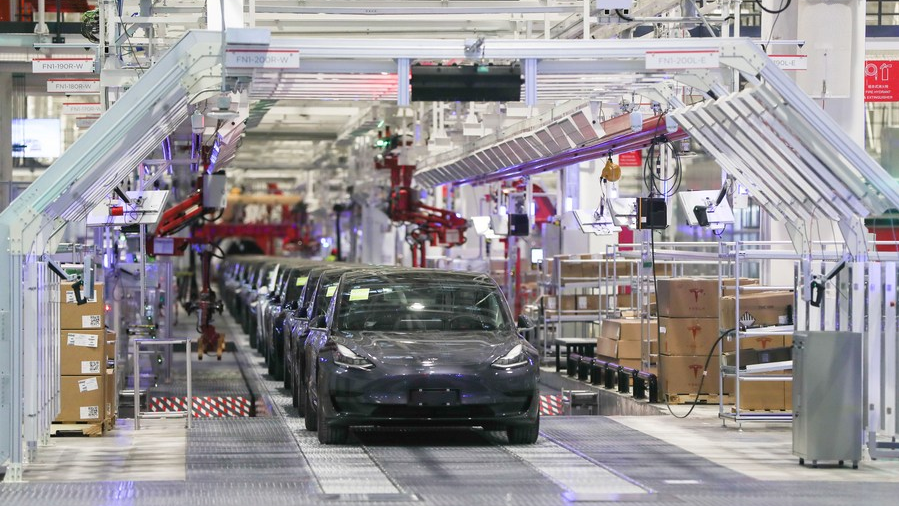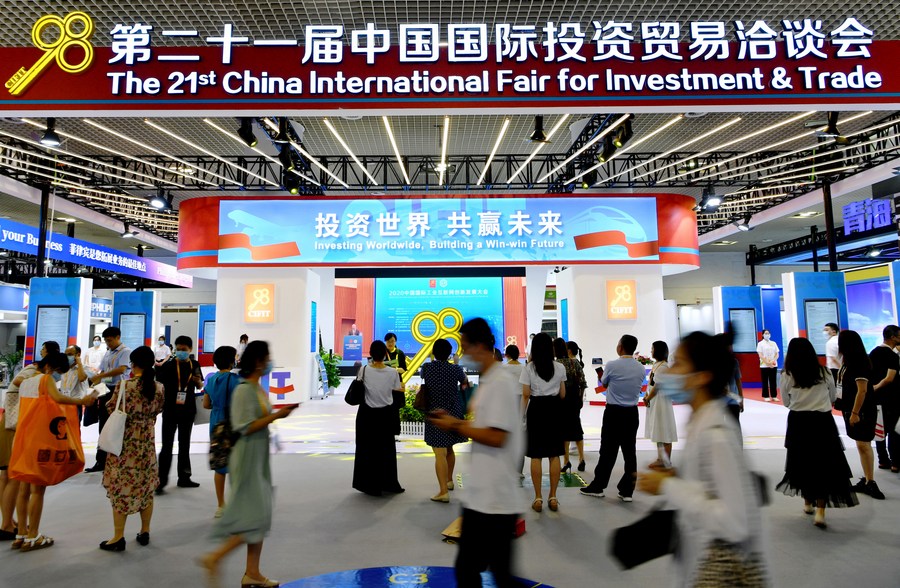
China-produced sedans at Tesla's gigafactory in Shanghai, east China, January 7, 2020. /Xinhua
China-produced sedans at Tesla's gigafactory in Shanghai, east China, January 7, 2020. /Xinhua
Editor's note: Azhar Azam works in a private organization as a market and business analyst and writes about geopolitical issues and regional conflicts. The article reflects the author's opinions and not necessarily those of CGTN.
Recent claims that foreign capital is leaving China or that manufacturing is moving away from the country are just part of crude efforts to erode the Chinese government's war on COVID-19 pandemic to protect people's lives. A couple of years ago, lockdowns in China sparked a conversation about moving supply chains from a land offering optimized shipping lanes, exceptionally cheap labor rates and access to the large young workforce.
Spurred by former U.S. President Donald Trump and his administration, trade bellicosity toward China in the middle of a rampant contagious virus changed the global commercial landscape and disrupted supply chains. Still, companies stayed in China, as higher wages and the lack of a skilled labor force in the U.S. manufacturing sector prevented them from relocating.
An immense talent pool of mature manpower makes China a very attractive destination for total supply chain solutions. China is a prized location for manufacturers since most countries do not have the capacity to produce as much as China does and on such a large scale. Beijing's effective pandemic control measures helped it to contain the virus quickly, which reassured foreign investors and enabled the country to witness record-high foreign direct investment (FDI) inflows hitting 1.149 trillion Chinese yuan ($172.12 billion) in 2021.
The recent COVID-19 restrictions in China have reignited a debate about moving supply chains from or expanding manufacturing away from the world's second largest economy. But experts argue not to pin any hope on the subject. According to Nick Marro, a global trade leader at the Economist Intelligence Unit, supply chain diversification is tricky. It may be a talking point in some boardrooms, but he says it is "difficult to implement."
A pair of surveys found that more than three quarters of factories aren't interested in shifting production or diverting investment from China as a result of the latest COVID-19 controls. They also unveil companies' strong trust in the Chinese market and its ability to bounce back as it did after the pandemic first hit. Beijing holds all the aces for global supply chains. During the first four months of 2022, FDI in China surged 26 percent year-on-year – including 53 percent, 76 percent and 80 percent from the U.S., the Republic of Korea and Germany respectively – to about $74.5 billion.
In 2021, revenue from China operations is expected to have leapt to 58 percent in 2021 from 35 percent a year earlier. Profitability went up too. The two key business metrics describe Beijing's importance for international firms and their plans for near-term investment in the country. Calls of reshoring have met a frosty response with China's inbound investment for the year increasing by a third to reach a new all-time high of $334 billion. The growth reflects that China's domestic market has by no means lost its shine for foreign corporations and their affiliates.

The 21st China International Fair for Investment and Trade in Xiamen, southeast China's Fujian Province, September 8, 2021. /Xinhua
The 21st China International Fair for Investment and Trade in Xiamen, southeast China's Fujian Province, September 8, 2021. /Xinhua
Many manufacturers say there is in no need of quitting China in response to claims that factories are leaving "the world's factory." The United Nations Conference on Trade and Development has seen a sharp rise of foreign investment in China over the last two years. More recently, the new relaxed COVID-19 restrictions in the Chinese financial hub of Shanghai will bolster international businesses to strengthen their foothold in the market.
The decline in the number of foreigners living in Shanghai versus a decade ago is often cited to manufacturers as a factor behind what some call a mass exodus of international residents and businesses from China. The half-truth overlooks the fact that the number of foreigners in Chinese provinces such as Guangdong, Fujian and Yunnan has jumped from 316,138, 62,564 and 47,396 in 2010 to 418,509, 106,248 and 379,281 in 2020 respectively, according to China's National Bureau of Statistics. The country remains a global magnet for many foreigners. Over 10 years, the number of foreigners living in China increased by more than 40 percent to 845,697.
The U.S. administration has been pressuring companies to shift manufacturing away from China. However, it's almost impossible to replace China with another country given its massive manufacturing power, integrated supply chain and large pool of skilled labor. For example, the world's largest iPhone campus in the outskirts of the city of Zhengzhou in central China's Henan Province, known as iPhone City, employs more than 200,000 workers.
Noting China's growth remains in "positive territory," Kristalina Georgieva, managing director at the International Monetary Fund, is very optimistic about Beijing's ability to reboot its economy through "ample" fiscal and monetary policy space. The unique leverage equips the Chinese government with enough room to sustain China's relentless rise as a global economic power at least for another century.
Global investors don't think the lockdowns and COVID-19 restrictions will adversely impact China's economy and its profile as a leading international investment destination. A group of top multinational banks, including Goldman Sachs, JPMorgan Chase and Credit Suisse, has even earmarked Shanghai as a major investment target in the coming years with decades-long business plans.
Clearly, the Chinese economy is far from being engulfed by pessimism, and foreign businesses are not falling out of love with China as some claim. China continues to be the most appealing investment market for international firms. Once the pandemic-induced curbs to safeguard human lives are lifted, the economy will gain momentum to further restore investors' confidence and stabilize the global supply chains.
(If you want to contribute and have specific expertise, please contact us at opinions@cgtn.com. Follow @thouse_opinions on Twitter to discover the latest commentaries in the CGTN Opinion Section.)

